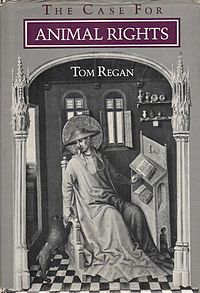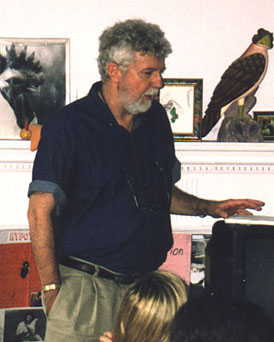
Animal welfare is the well-being of non-human animals. Formal standards of animal welfare vary between contexts, but are debated mostly by animal welfare groups, legislators, and academics. Animal welfare science uses measures such as longevity, disease, immunosuppression, behavior, physiology, and reproduction, although there is debate about which of these best indicate animal welfare.

David Sztybel is a Canadian philosopher specializing in animal ethics.

Gary Lawrence Francione is an American academic in the fields of law and philosophy. He is Board of Governors Professor of Law and Katzenbach Scholar of Law and Philosophy at Rutgers University in New Jersey. He is also a visiting professor of philosophy at the University of Lincoln (UK) and honorary professor of philosophy at the University of East Anglia (UK). He is the author of numerous books and articles on animal ethics.

The animal rights (AR) movement, sometimes called the animal liberation, animal personhood, or animal advocacy movement, is a social movement that seeks an end to the rigid moral and legal distinction drawn between human and non-human animals, an end to the status of animals as property, and an end to their use in the research, food, clothing, and entertainment industries.

Animal rights is the philosophy according to which many or all sentient animals have moral worth independent of their utility to humans, and that their most basic interests—such as avoiding suffering—should be afforded the same consideration as similar interests of human beings. Broadly speaking, and particularly in popular discourse, the term "animal rights" is often used synonymously with "animal protection" or "animal liberation". More narrowly, "animal rights" refers to the idea that many animals have fundamental rights to be treated with respect as individuals—rights to life, liberty, and freedom from torture that may not be overridden by considerations of aggregate welfare.

Roger Yates is an English lecturer in sociology at University College Dublin and the University of Wales, specialising in animal rights. He is a former executive committee member of the British Union for the Abolition of Vivisection (BUAV), a former Animal Liberation Front (ALF) press officer, and a co-founder of the Fur Action Group.

The Case for Animal Rights is a 1983 book by the American philosopher Tom Regan, in which the author argues that at least some kinds of non-human animals have moral rights because they are the "subjects-of-a-life," and that these rights adhere to them whether or not they are recognized. The work is considered an important text within animal rights theory.
Joan Dunayer is an American philosopher and abolitionist animal rights advocate. She is the author of two books, Animal Equality (2001) and Speciesism (2004). She has argued for "species equality" the view that all animals including insects should be given rights.
David Alan Nibert is an American sociologist, author, activist and professor of sociology at Wittenberg University. He is the co-organizer of the Section on Animals and Society of the American Sociological Association. In 2005, he received their Award for Distinguished Scholarship.
Animal protectionism is a position within animal rights theory that favors incremental change in pursuit of non-human animal interests. It is contrasted with abolitionism, the position that human beings have no moral right to use animals, and ought to have no legal right, no matter how the animals are treated.

Norm Phelps was an American animal rights activist, vegetarian and writer. He was a founding member of the Society of Ethical and Religious Vegetarians (SERV), and a former outreach director of the Fund for Animals. He authored four books on animal rights: The Dominion of Love: Animal Rights According to the Bible (2002), The Great Compassion: Buddhism and Animal Rights (2004), The Longest Struggle: Animal Advocacy from Pythagoras to PETA (2007), and Changing the Game: Animal Liberation in the Twenty-first Century (2015).

Animals, Property, and the Law (1995) is a book by Gary Francione, Distinguished Professor of Law and Nicholas deB. Katzenbach Scholar of Law and Philosophy at Rutgers School of Law–Newark. The book was the first extensive jurisprudential treatment of animal rights.

Animal Rights Without Liberation: Applied Ethics and Human Obligations is a 2012 book by the British political theorist Alasdair Cochrane, in which it is argued that animal rights philosophy can be decoupled from animal liberation philosophy by the adoption of the interest-based rights approach. Cochrane, arguing that there is no reason that (nonhuman) animals should be excluded from justice, adopts Joseph Raz's account of interest rights and extends it to include animals. He argues that sentient animals possess a right not to be made to suffer and a right not to be killed, but not a right to freedom. The book's chapters apply Cochrane's account to a number of interactions between humans and animals; first animal experimentation, then animal agriculture, the genetic engineering of animals, the use of animals in entertainment and sport, the relationship of animals to environmental practices and the use of animals in cultural practices.

The commodity status of animals is the legal status as property of most non-human animals, particularly farmed animals, working animals and animals in sport, and their use as objects of trade. In the United States, free-roaming animals are (broadly) held in trust by the state; only if captured can be claimed as personal property.

Rain Without Thunder: The Ideology of the Animal Rights Movement is a 1996 book by American legal scholar Gary L. Francione. The basic premise of the book is that there is a fundamental difference between those that call for animal welfare reform and those that call for the complete abolition of animal use, and that animals have a fundamental right to not be exploited.

Animal–industrial complex (AIC) is a concept used by activists and scholars to describe what they contend is the systematic and institutionalized exploitation of animals. It includes every economic activity involving animals, such as the food industry, animal testing, medicine, clothing, labor and transport, tourism and entertainment, selective breeding, and so forth. Proponents of the term claim that activities described by the term differ from individual acts of animal cruelty in that they constitute institutionalized animal exploitation.
Satya was an American monthly magazine which covered vegetarianism, animal rights, environmentalism and social justice issues. It was co-founded by Beth Gould and Martin Rowe in 1994 and released its final issue in 2007. Scholar Gary Francione says Satya became the main journal that promoted animal welfare after the demise of The Animals' Agenda in 2002.
Corey Lee Wrenn is an American sociologist specializing in human-animal studies, the sociology of the animal rights movement, ecofeminism, and vegan studies. She is presently a lecturer in the School of Social Policy, Sociology and Social Research at the University of Kent.

Valéry Giroux is a Canadian philosopher, lawyer and animal rights activist from Quebec. She is an adjunct professor at the Université de Montréal Faculty of Law, associate director for the Centre de recherche en éthique, a Fellow of the Oxford Centre for Animal Ethics, and an author and speaker on animal ethics issues and veganism, with a notable focus on the topic of antispeciesism through her co-editorship of the antispeciesist journal L'Amorce. Her philosophy argues for the equal moral consideration of all sentient beings, objects to the ethical notion that the utilization of non-human animals by humans as being morally permissible, and advocates for the individual right to freedom for all sentient beings, regardless of their species, emphasizing negative or republican freedom over positive freedom.















